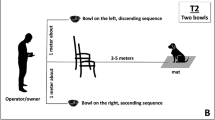Abstract
College students participated in three experiments on operant sequential stereotypy. In Experiment 1, subjects guided a marker through a 6 × 6 matrix by pressing two computer keys in sequence. Subjects were awarded points on seven schedules of reinforcement. Points were exchanged for money. The results showed that the level of stereotypy was greatest for behavior rewarded on a continuous reinforcement (CRF) schedule. In Experiment 2, responding was rewarded on a variable ratio (VR) 3 schedule for an extended number of trials or with a higher magnitude reward than in Experiment 1. Neither manipulation enhanced stereotypy. In Experiment 3, subjects were tested with two schedules of reinforcement as a within-subjects manipulation. Initial exposure to a CRF schedule produced a relatively high level of stereotypy that persisted through a VR 3 schedule, whereas initial exposure to a VR 3 schedule produced a relatively low level of stereotypy that increased significantly when subjects were switched to a CRF schedule. The results are discussed in the context of efficient responding.
Similar content being viewed by others
References
BOYD, W. T., & GUTMAN, A. (1990). Factors affecting sequential behavior in a point-earning task. The Psychological Record, 40, 555–564.
GROSS, D. K., & GUTMAN, A. (1988). Effects of schedule and length of training on reward-induced stereotypy and negative transfer in humans. The Psychological Record, 38, 567–594.
HERRNSTEIN, R. J. (1961). Stereotypy and intermittent reinforcement. Science, 133, 2067–2069.
KEPPEL, G. (1973). Design and analysis: A researcher’s handbook. Englewood Cliffs, NJ: Prentice-Hall.
OLTON, D. S. (1979). Mazes, maps, and memory. American Psychologist, 34, 583–596.
PEAR, J. J., & ELDRIDGE, G. D. (1984). The operant-respondent distinction: Future directions. Journal of the Experimental Analysis of Behavior, 42, 453–467.
REPP, A. C., & KARSH, K. G. (1992). Stereotypy. In E. A. Konarski, J. E. Favell, & J. E. Favell (Eds.), Manual for the assessment and treatment of the behavior disorders of people with mental retardation. Morganton, NC: Western Carolina Center Foundation.
SCHWARTZ, B. (1982). Reinforcement-induced behavioral stereotypy: How not to teach people to discover rules. Journal of Experimental Psychology: General, 111, 23–59.
SCHWARTZ, B. (1988). The experimental synthesis of behavior: Reinforcement, behavioral stereotypy, and problem solving. In G. H. Bower (Ed.), The psychology of learning and motivation (Vol. 22). New York: Academic Press.
SCHWARTZ, B. (1989). Psychology of learning and behavior. New York: W.W. Norton & Co.
SEELEY, R. J., & BROZOSKI, T. J. (1989). Measurement and quantification of stereotypy in freely behaving subjects: An information analysis. Behavior Research Methods, Instruments, & Computers, 21, 271–274.
TATHAM, T. A., WANCHISEN, B. A., & HINELINE, P. N. (1993). Effects of fixed and variable ratios on human behavioral variability. Journal of the Experimental Analysis of Behavior, 59, 349–359.
VOGEL, R., & ANNAU, Z. (1973). An operant discrimination task allowing variability of reinforced response patterning. Journal of the Experimental Analysis of Behavior, 20, 1–6.
WILLNER, J. H., SAMACH, M., ANGRIST, B. M., WALLACH, M. B., & GERSHON, S. (1970). Drug-induced stereotyped behavior and its antagonism in dogs. Communications in Behavioral Biology, 5, 135–141.
WONG, P. T. P., & PEACOCK, E. J. (1986). When does reinforcement induce stereotypy? A test of the differential reinforcement hypothesis. Learning and Motivation, 17, 139–161.
Author information
Authors and Affiliations
Rights and permissions
About this article
Cite this article
Lopatto, D.E., Brown, B.M. The Effects of Schedules of Reinforcement on Operant Sequential Stereotypy in Humans. Psychol Rec 44, 185–206 (1994). https://doi.org/10.1007/BF03395127
Published:
Issue Date:
DOI: https://doi.org/10.1007/BF03395127




